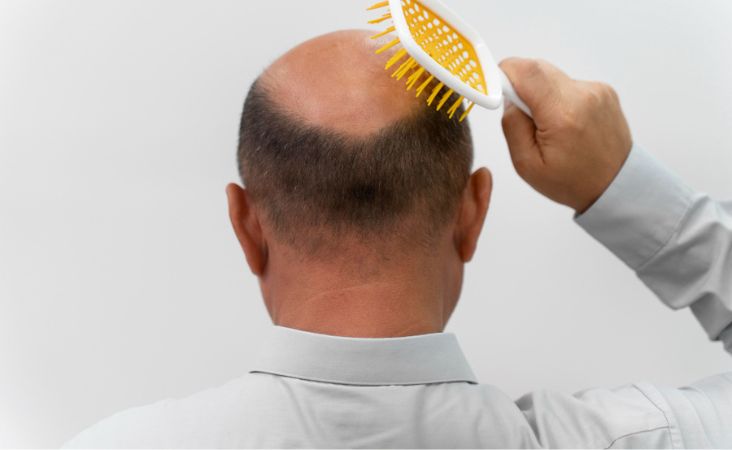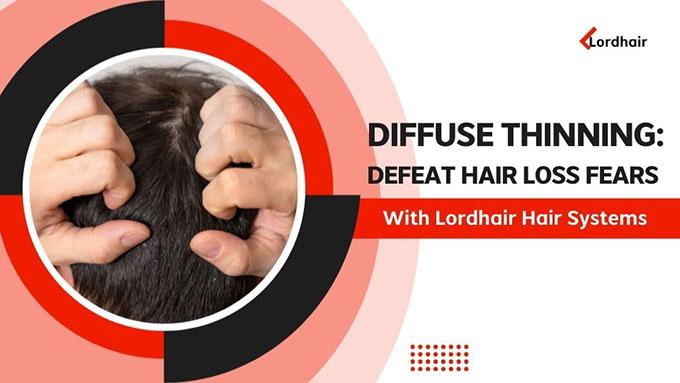6 Hormones That Cause Hair Loss in Men and Women
- Written by Victor Lordhair
- Sep 30, 2023
- |
- 6 min read
 Listen to the full text
Listen to the full textWhen thinking of reasons behind hair loss, our minds often gravitate toward factors such as stress, poor nutrition, or certain medical conditions. However, a reason that often escapes us is hormones. According to dermatologists, a lot of hormones can play a significant role in hair fall and thinning in both men and women.
In this blog, Lordhair - trusted globally for hair toupees and women's wigs- will provide you with a list of hormones that are major culprits of hair loss in all genders. By understanding how they can affect your hair, you’ll be able to decide what to do to tackle baldness triggered by them.
So, let’s dive in!
Which Hormones Cause Hair Loss in Men and Women?
The following are hormones that cause hair loss in both men and women:
Dihydrotestosterone (DHT)
Dihydrotestosterone plays a crucial role in the human body, especially during the initial years of growth in men. Derivative of testosterone, this hormone is responsible for the development of male characteristics during puberty such as facial hair and a deeper voice. However, when it comes to hair loss, DHT can become problematic.
In some individuals, particularly those genetically predisposed to male pattern baldness, hair follicles on the scalp become sensitive to dihydrotestosterone. The presence of this hormone can cause follicles to shrink, leading to finer and shorter hair growth cycles. As time passes, they may stop producing hair altogether, resulting in baldness.
How to stop this hormone from causing hair loss
Consider the following treatments to treat DHT-induced hair loss:
-
DHT blockers: There are certain medications that can inhibit the production of DHT in the body. These blockers work by targeting enzymes responsible for converting testosterone into DHT, effectively slowing down hair loss progression.
-
Topical solutions: Some topical solutions can be applied directly to the scalp to counteract the effects of DHT on hair follicles. These often contain active ingredients that strengthen existing hair and stimulate hair growth.

Estrogen
Estrogen is responsible for the development of secondary sexual characteristics in women such as breast growth and regulation of the menstrual cycle. Regardless, fluctuations or imbalances in levels of these hormones can lead to hair loss. For example, during pregnancy or menopause, estrogen levels can change significantly. They often result in hair thinning.
Additionally, conditions like polycystic ovary syndrome (PCOS) can lead to increased androgens. This disrupts the balance between estrogen and other hormones, contributing to hair loss.
How to address estrogen hormone-related hair loss
To address estrogen-related hair loss, you can try the following treatments:
-
Hormone replacement therapy: HRT involves supplementing estrogen levels in cases of deficiency (for instance, during menopause) to address hormone-related hair loss. This treatment rebalances hormones and promotes hair growth.
-
Scalp massage: Regular scalp massages are known to increase hair thickness by stretching the cells of hair follicles. This, in turn, improves blood circulation and stimulates follicles to produce thicker hair.
Thyroid hormones
Thyroid hormones - specifically triiodothyronine (T3) and thyroxine (T4) - are essential for regulating metabolism and maintaining overall bodily functions in both men and women. They help in controlling energy production and influencing every organ system in the human body. But when the thyroid gland is underactive (hypothyroidism) or overactive (hyperthyroidism), it disrupts hair growth.
Hypothyroidism can lead to hair thinning and increased shedding. Hyperthyroidism, on the other hand, can cause hair to become brittle and break more easily.
How to stop hair loss caused by this hormone
The following treatments will help you overcome hair loss caused by an imbalance in thyroid hormones:
-
Levothyroxine: Thyroid hormone replacement medications like levothyroxine can help men and women restore normal thyroid function disrupted by hypothyroidism. However, make sure to take a prescription from your dermatologist as this medication has its share of side effects.
-
Dietary supplements: Supplements containing essential nutrients like iodine and selenium can also support thyroid health. They will help you optimize thyroid function and reduce hair loss linked to imbalances caused by this type of hormone.
You may also be interested in:
- Learn all about thyroid hair loss
- Diseases that cause hair loss in men and women
- Your ultimate guide to stopping PCOS hair fall and thinning
Cortisol
A hormone produced by the adrenal glands, cortisol plays an important role in the body’s stress response. Often referred to as a stress hormone, it helps regulate metabolism, immune response, and blood pressure when present in healthy amounts in the body. Elevated and prolonged levels of cortisol due to chronic stress, however, can disrupt the hair growth cycle.
According to dermatologists, men and women who have high levels of cortisol often face a stress-induced hair fall condition called telogen effluvium. In this, a significant number of hair follicles prematurely enter the resting (telogen) phase and subsequently shed. This can result in noticeable hair thinning.

How to address cortisol hormone-related hair loss
Here are some treatments for overcoming hair loss caused by cortisol hormones:
-
Stress reduction practices: Engaging in stress-reduction practices like mindfulness meditation, yoga, deep breathing exercises, and progressive muscle relaxation can help in lowering cortisol levels. By managing stress effectively, you can reduce its impact on hair health.
-
Healthy lifestyle choices: Adopting a balanced lifestyle that includes a well-balanced diet and adequate sleep can also contribute to overall stress reduction.
Insulin
For those unaware, let us tell you that insulin is a hormone produced by the pancreas. Its primary function is to allow cells in the body to take in glucose (sugar) from the bloodstream and use it for energy. This process helps in maintaining stable blood sugar levels and supports overall health.
Imbalances in insulin levels (often triggered by conditions like diabetes or insulin resistance) can result in hair thinning and shedding. In some cases, it can also lead to inflammation which may negatively affect the hair follicles and disrupt the normal hair growth cycle.
How to stop hair loss caused by this hormone
The following treatments will help you reduce stress-related hair fall:
-
Intermittent fasting: Intermittent fasting involves alternating periods of eating and fasting which may assist in regulating blood sugar levels. This, as a result, encourages healthier hair growth.
-
Biotin and zinc supplements: Both biotin and zinc supplements can also be used for addressing hair loss triggered by insulin imbalance in the body. Biotin will promote hair health by supporting the formation of keratin in strands. Zinc, on the other hand, will regulate insulin levels. It may indirectly mitigate hair loss associated with it.
Progesterone
Another hormone that causes hair loss in women. Progesterone is produced primarily in the ovaries. Known for its role in the menstrual cycle and pregnancy, it also regulates various reproductive functions for maintaining a healthy pregnancy. Fluctuations in this hormone can contribute to hair thinning in women.
Certain female problems such as transition to menopause or medical conditions like PCOS can cause imbalances in progesterone.
How to treat hair loss caused by progesterone hormone
Here are methods specifically designed for treating hair fall caused by an imbalance of this hormone:
-
Hormone balancing diet: Adopting a diet rich in foods that support hormonal balance such as omega-fatty acids from sources like fish and flaxseeds can help in stabilizing progesterone levels, ultimately reducing hair loss in women.
-
Scalp nourishing oils: Applying natural oils like rosemary oil and lavender oil to the scalp can help women improve blood circulation to their hair follicles and strengthen their hair strands. Make sure to use the tip of your fingers gently instead of rubbing them vigorously through the scalp.

Hormones That Cause Baldness: Final Words
Above are some hormones known to trigger hair loss and thinning in both men and women. It is pivotal to recognize that while hormones can play a significant role in hair health, the cause sometimes can be multifaceted. That means that it’s not just one hormone at play but a combination of factors.
Make sure to consult with a dermatologist to identify the root cause and determine the most appropriate treatment plan. Buy hair systems to conceal hair loss in the meantime. Also known as modern-day wigs, men's human hair wigs, and men’s hairpieces, these non-surgical options provide an immediate and natural-looking solution to bald patches and thinning hair.
As a leading manufacturer, Lordhair ships hair wigs, toupees, and toppers to 100+ countries while promising premium quality and a money-back guarantee. Feel free to contact us or leave a comment below. We’ll be more than happy to answer your queries!



